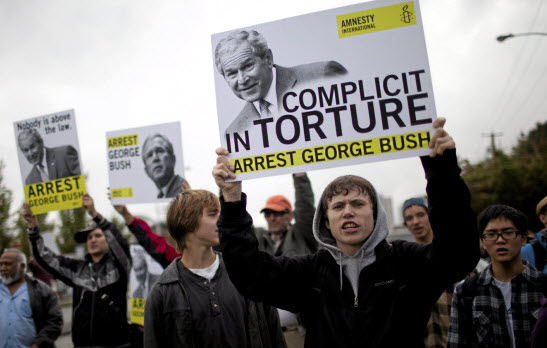Wednesday, four men who were detained and tortured by U.S. forces in Guantánamo and Afghanistan are filing a petition with the United Nations’ Committee against Torture in Geneva. But the petition is not against the United States, as you might expect. Instead, the men seek to hold Canada responsible for its refusal to investigate or prosecute George W. Bush for torture when the former president visited British Columbia last year.
The UN Committee is charged with monitoring States’ compliance with the widely ratified Convention against Torture, a treaty requiring nations to investigate and submit for prosecution — or extradite to another country for prosecution — alleged torturers present in their territory. The idea behind this obligation is to create a worldwide net, leaving torturers nowhere to run and bringing us closer to an end to impunity for this heinous crime.
Wednesday’s action comes on the heels of two related developments. Over the summer, the Committee conducted a periodic review of Canada and, fully aware of Bush’s 2011 visit, called on the government to “take all necessary measures with a view to ensuring the exercise of the universal jurisdiction over persons responsible for acts of torture, including foreign perpetrators who are temporarily present in Canada.”
Then, just one month ago, Omar Khadr, so long stranded in Guantánamo, finally returned home to Canada. The Supreme Court of Canada has already ruled that the Canadian government violated Khadr’s Charter rights by interrogating him in Guantánamo under the unlawful detention program there.
In his 2010 memoir and elsewhere, Bush has openly acknowledged that he ordered the waterboarding — the pouring of water over an immobilized prisoner’s face to the point where the person believes he or she is drowning — of detainees in U.S custody. His precise words were, “Damn right.” He also approved an interrogation program with techniques that experts, including the International Committee of the Red Cross and several United Nations rapporteurs, have denounced as torture. Yet Bush has not been held accountable and faces no charges in the United States. This, despite the fact that Amnesty International, Human Rights Watch and other respected groups have called for the investigation and prosecution of Bush and other high-level officials from his administration.
The four men at the centre of the petition being filed today in Geneva endured years of inhumane treatment at the hands of U.S officials in Afghanistan and Guantánamo. Hassan bin Attash, Sami el-Hajj, Muhammad Khan Tumani and Murat Kurnaz survived beatings, being hung from walls or ceilings, sleep, food and water deprivation and exposure to extreme temperatures, among other forms of abuse. American officials finally released el-Hajj — a reporter with Al-Jazeera — after seven years. They released Kurnaz after five years and Khan Tumani, arrested when he was 17, after eight years. The U.S. government never laid charges against any of the men. Meanwhile, Bin Attash, who was only 16 when detained eight years ago, remains at Guantánamo, though he has never been formally charged with any wrongdoing.
The torture survivors’ petition is being submitted jointly by Canadian and American organizations, the Canadian Centre for International Justice and the Center for Constitutional Rights. Last year, three weeks before Bush’s visit to Canada, these two groups sent a letter, a 69-page draft indictment and approximately 4000 pages of evidence — consisting primarily of reports and investigations conducted by various U.S. agencies and the United Nations — to the Attorney General of Canada calling on him to investigate and prosecute the former U.S. president.
When the Attorney General refused to act, the organizations initiated a private prosecution under the Criminal Code of Canada. On the morning of Bush’s arrival, a Justice of the Peace in British Columbia received a criminal information filed on behalf of the four petitioners charging Bush with four counts of violating the Criminal Code provision that punishes torture even when committed outside Canada. Although almost 60 human rights groups and prominent individuals publicly supported the private prosecution, the Attorney General of British Columbia intervened and terminated the proceedings.
The prosecution of a former U.S. president may sound improbable — too often politics trumps justice — yet Canada has a history of trying people responsible for international crimes. In 2010, a court in Montreal sentenced Désiré Munyaneza to life imprisonment for crimes against humanity, genocide and war crimes he committed in Rwanda. Another Rwandan man, Jacques Mungwarere, is now on trial in Ottawa. The Department of Justice and RCMP have units dedicated to these cases.
Even the threat of prosecution does have an impact. Last year, ahead of a planned visit to Switzerland, two torture survivors attempted to initiate criminal proceedings against Bush. He cancelled the trip after news of the planned prosecution, and the apparent unwillingness of Swiss authorities to block it, came to light.
With its refusal to move against Bush, the government of Canada missed a critical opportunity to take a stand against torture — even if it meant ruffling the feathers of a close ally. When Canada, like the United States, signed on to the Convention against Torture, it endorsed the global system of prosecutions as a means for deterring would-be torturers, delivering justice to survivors and putting those responsible behind bars. Last year, Canada could have sent a resounding signal to the world that torture can never be tolerated.
Now we will see if Canada’s failure to do so will result in condemnation by the Committee against Torture.
Matt Eisenbrandt is the Legal Coordinator for the Canadian Centre for International Justice.
Photo: AmnestyUSA.org



